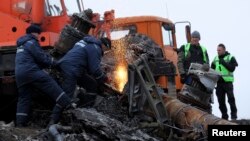In its annual safety report released Monday, the International Air Transport Association (IATA) is calling 2014 the safest year ever for commercial aviation in terms of the number of serious accidents. That despite several high-profile fatal crashes.
It might not seem like it from looking at the news but 2014 was a very safe year for aviation with three-point-three billion people arriving at their destinations unscathed.
The International Air Transport Association says although the number of people dying in air accidents last year was above the average of recent years, data show that in terms of planes lost due to "hull losses" it was the safest year on record.
A hull loss is an accident in which the aircraft is destroyed or damaged so severely that it is not subsequently repaired.
The chief executive of IATA, Tony Tyler, characterized 2014 as a year of contrasts for aviation safety.
"We did have some very high profile, very tragic accidents and in fact we had three jet hull losses which caused loss of life and so it was certainly a year where airline safety was very much in the headlines," he said. "However, when we look at the picture as a whole, it was in fact a year when air safety improved quite significantly and in fact only one flight in every 4.4 million had an accident resulting in hull loss."
The statistics do not include the loss of Malaysia Flight 17 last July, which is believed to have been shot down by suspected pro-Russian separatist fighters near Russia’s border with Ukraine, killing all 238 on board.
Because a missile shot it down, it is not classified as an accident. But even if MH17 were included, IATA states, there would have still been an overall reduction in the number of fatal accidents in 2014 compared to previous years.
Last year saw what is regarded as aviation's biggest unsolved mystery -- the disappearance of Malaysia Airlines Flight 370. One year ago Sunda, March 8, the flight veered off its course to Beijing after a takeoff from Kuala Lumpur and presumably went down in the southern Indian Ocean, far off Australia's western coast. But no physical evidence of the crash has ever been found.
The IATA boss, Tyler, says in the wake of the MH370 incident the whole industry is united in finding a way to track aircraft better.
"And we need to make sure that those ways are developed and implemented as soon as we can," said Tyler.
IATA says there were 12 fatal accidents last year with 641 fatalities compared to an average over the previous five years of 19 deadly crashes with 517 fatalities annually.
Besides the two Malaysia Airlines incidents, other significant jet accidents last year included a crash in Mali of an Air Algeria flight during bad weather, killing all 116 aboard, and the Air Asia crash into the Java Sea with no survivors among the 162 passengers and crew.
Nine of the 12 deadly crashes last year involved turboprop planes, which have a higher accident rate than jets.
IATA says it is striving to make flying even safer and has a six-point safety strategy, including looking at emerging concerns, such as carrying potentially explosive lithium batteries on aircraft.
The association, based in Geneva, represents about 250 airlines.





